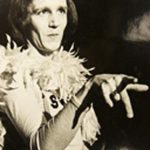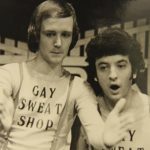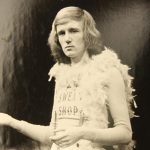Company Name: Gay Sweatshop Theatre Company
Writers: Roger Baker and Drew Griffiths
Cast: Drew Griffiths, Alan Pope, Phillip Howells, Gordon McDonald
Year:1975
The Campaign for Homosexual Equality (CHE) had formed in 1969. CHE was a national organization that worked to change attitudes and laws that negatively affected gay people in England and Wales. In 1975, they invited Gay Sweatshop to perform at their annual conference in Sheffield. The first Gay Sweatshop company show was Mister X, a devised piece based on a combination of personal experiences and a booklet called With Downcast Gays: Aspects of Homosexual Self-Oppression written by Andrew Hodges and David Hutte.
‘The ultimate success of all forms of oppression is our self-oppression. Self-opression is achieved when the gay person has adopted and internalized straight people’s definition of what is good and bad.’ (With Downcast Gays: Aspects of Homosexual Self-Oppression, written by Andrew Hodges and David Hutte)
Audio: BBC Radio recording of Mister X
Mister X is a ‘coming-out’ tale which illustrates the journey of a gay man from adolescence, through various stages of self-oppression until his proud liberation. If the school boys’ hostile homophobia was to be expected, it was the self-oppression from other gay men that gave the play its poignancy. This was a time when pride in one’s sexuality was a revolutionary act. The play engaged with the debate about whether homosexuals should lead a quiet, conservative life to fit into the status quo or participate in direct action to achieve equality.
‘Mister X says the only way to live is by aping heterosexual conduct and behavior, I say we’re Gay and thank God for it – not for us sterile marriages and stereotypical role playing. Mister X says let’s be discreet and not rock the boat. I say let’s rejoice in being gay and don’t rock the boat – sink the bloody thing!’
Audio: BBC Radio recording of Mister X
The show was a huge success at the Sheffield CHE conference, which made a direct connection between the material, the audience and the actors. From this success the company was inundated with offers to perform the show. A small Arts Council grant enabled the company to take the show on tour around the country until Christmas. Its controversial nature gained notoriety as soon as the tour started. One of the first London performances took place in Golders Green Unitarian Church. During the performance a local vicar took offence at the material and proceeded to heckle the actors. The Hampstead and Highgate Express ran with the headline: ‘Vicar in Gay Play Rumpus – Heckling Minister Ejected During Show at Church’.
The show continued the tour, in CHE rallies, universities and alternative theatre venues, performing in Exeter, Lancaster, Newcastle, Manchester, Wolverhampton, Brighton, Cambridge, Wakefield, Leicester, Leeds, Nottingham and Southampton. The company received numerous letters of support from audience members in praise of the show, for many this would have been the first positive view of homosexuals that the audience would have seen.
‘I don’t like it when people dress up, when women dress up as men or men dress up as women and present the worst aspect of either. I like drag when it’s cheery. I don’t like it when it’s gross and sexist because do we need to see that again?- we know what it’s like. But if it’s fun I don’t mind. Drew Griffiths was the best at drag. Did you ever see him do Mister X – the original Gay Sweatshop show? It’s not on film but I think there’s a sound thing of it. It’s based on these men that used to do the Vauxhall Tavern. He starts off doing these jokes and people are laughing and he changed the tone, and a shudder came over me because he became angry when he was doing it. He was glamorous and doing these sexist gay men’s jokes and suddenly he turned it so it was anger thing. I’m still thinking about it, the shudder that used to go round everyone. That was sort of brilliant. But he could also do it, just as drag, being an ugly sister.’ Kate Crutchley, 2007



